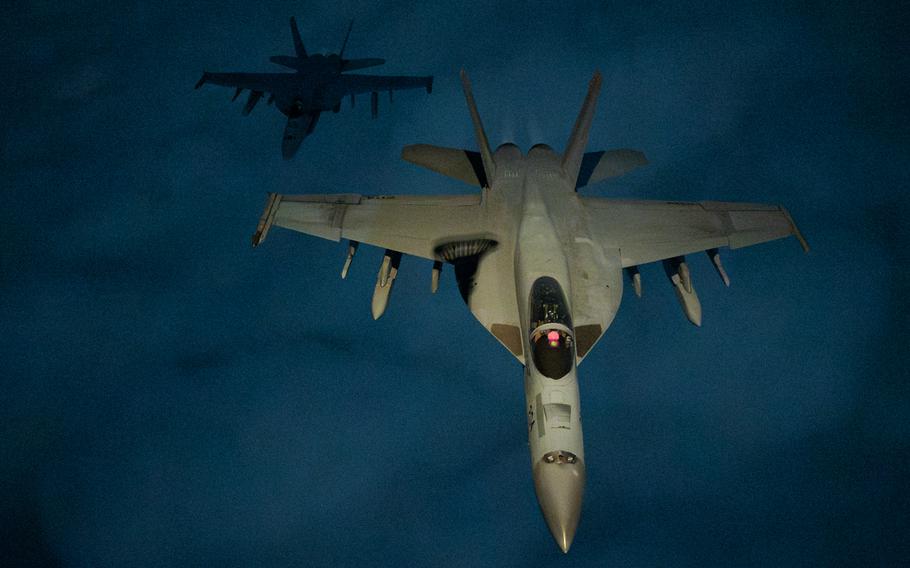
Navy F/A-18 Super Hornets fly in formation over the U.S. Central Command area of responsibility on April 5, 2025. Two months after the end of the U.S. military’s Operation Rough Rider against the Houthi militants in Yemen, the Iran-backed group claimed responsibility for a Sunday attack on a ship in the Red Sea and is being blamed for a fatal attack the following day. (Gerald Willis/U.S. Air Force)
The U.S. military spent hundreds of millions of dollars earlier this year in a six-week barrage intended to stop the Iran-backed Houthi rebels in Yemen from targeting ships in the Red Sea.
Now, just two months after President Donald Trump received assurances “that they wouldn’t be shooting at ships anymore,” it appears the Houthis are back at it.
They claimed responsibility for an attack Sunday on a bulk carrier that eventually sank, and they are being blamed by the U.S. and European Union for another on a cargo ship the following day. That attack killed at least three mariners and wounded two others, The Associated Press reported.
The renewed attacks come as the U.S. tries to broker an end to the war between Israel and Hamas while also reopening diplomatic talks with Iran.
Experts say the resumption highlights the Houthis’ durability, making the U.S. the latest adversary facing the challenge of figuring out how to deal with a militant group that has fended off all previous military efforts to dislodge them from power.
And with Iran’s allies in Lebanon, Syria and Gaza nearly decimated, the Yemen-based fighters have become essential to Tehran.
“The Houthis are the long pole of the tent when it comes to Iranian proxy capabilities,” said Behnam Ben Taleblu, senior director of the Iran program at the Foundation for Defense of Democracies. “The regime is trying to threaten wider regional ramifications in case Israel or America see that there’s an opportunity to go back militarily against (Iran).”
The White House condemned the attacks in a statement Tuesday and alluded to possibility of another American intervention.
“The United States has been clear: We will continue to take necessary action to protect freedom of navigation and commercial shipping from Houthi terrorist attacks, which must be condemned by all members of the international community,” State Department spokeswoman Tammy Bruce said.
But Trump has yet to directly acknowledge the attacks, and it could take a significant escalation to bring the U.S. back into a war with the militant group, which has been careful to frame the strikes as part of its conflict with Israel.
“I assume the U.S. won’t intervene unless the attacks return to the scale and momentum seen before its spring military campaign against the Houthis,” said Nadwa Al-Dawsari, a fellow at the Geneva-based Center on Armed Groups.
The Houthis first began attacking ships in the Red Sea and the Gulf of Aden with missiles and drones in late 2023, saying they were retaliating for the Israel-Hamas war.
Attacks on merchant ships slowed significantly in January, when the Houthis said they would focus only on Israel-linked vessels.
But maritime traffic through the Bab el Mandeb, a strait connecting the Red Sea and the Gulf of Aden, remained lower than the levels seen in 2022 and 2023, according to the Joint Maritime Information Center.
Between mid-March and late April, the Pentagon responded with Operation Rough Rider at an estimated cost of $1 billion. U.S. forces expended thousands of missiles and bombs, taking out major Houthi weapons caches, infrastructure and top military leaders.
Over the course of the operation, the U.S. also lost at least seven $30 million MQ-9 Reaper drones, according to the AP, and two F/A-18 Super Hornets that slipped off the deck of the aircraft carrier USS Harry S. Truman.
The Houthis, who control the Yemeni capital of Sanaa, have survived 11 years of war with the country’s internationally recognized government and a supporting coalition led by Saudi Arabia.
A truce from 2022 has largely held, with the Houthis maintaining their hold on Yemen’s critical coastline.
Airstrikes could degrade their capabilities, but experts have said a decisive defeat would require an American ground incursion, something the administration was loath to do.
Throughout the 2024 campaign, Trump expressed a desire to stay out of Middle Eastern conflicts, vowing not to let the U.S. get sucked into another decadeslong war.
Even after launching Rough Rider, he wanted to see results quickly, according to reports from The New York Times. Six weeks in, the operation was suddenly halted, with Trump saying the two sides had reached an agreement to stop fighting.
Farea al-Muslimi, a research fellow at the London-based Chatham House and expert on Yemen, said the ceasefire was an “optics and communication deal” that is “extremely fragile.”
Tensions are still high after the U.S. and Iran exchanged fire last month, with the U.S. bombing of three major Iranian nuclear facilities followed by Tehran’s launch of more than a dozen missiles at Al Udeid Air Base in Qatar.
The missile strikes resulted in no reported injuries or deaths to U.S. personnel, most of whom had been evacuated from the base. Both Qatar and Patriot air defense system crews intercepted the missiles, according to U.S. Central Command.
Even with their losses from Operation Rough Rider, the Houthis still have some military capabilities, said Wolf-Christian Paes, a senior fellow at the International Institute for Strategic Studies who previously served as the arms expert on a U.N. panel regarding Yemen.
He said even the threat of violence is enough to cause a problem.
“You don’t need to attack a ship every day if you want to shake the confidence of the shipping community,” he said. “And that’s what this is about. It’s enough to have one successful attack.”